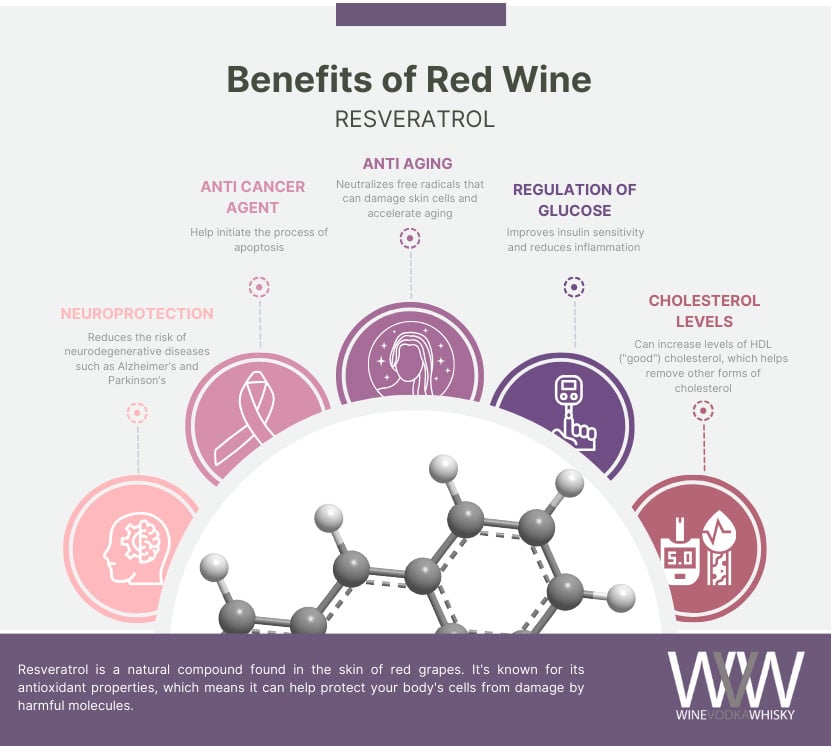When it comes to alcoholic beverages, red wine has long been associated with many health benefits. From promoting heart health to improving cognitive function, the claimed advantages of red wine have received much attention. However, it is crucial to distinguish between fact and fiction, separating the myths from reality. In this article, we will explore the potential benefits of red wine, backed by scientific evidence, and debunk any misconceptions that might exist.
What Are The Benefits of Red Wine?
Resveratrol and its Potential Benefits
Resveratrol is a natural compound found in the skin of red grapes. It’s known for its antioxidant properties, which means it can help protect your body’s cells from damage by harmful molecules. It is thought that this particular polyphenol may help protect the lining of blood vessels in the heart. It may also have several other health benefits, including anti-inflammatory and anti-cancer properties.

Antioxidant Properties and Heart Health
One of the primary reasons red wine has gained attention is its antioxidant properties. Antioxidants help protect the body’s cells from damage caused by harmful molecules called free radicals. Some studies suggest that the antioxidants in red wine, such as flavonoids and polyphenols, may have a positive impact on heart health by reducing inflammation and preventing blood clot formation. This could also lower the risk of heart disease.
Blood Pressure
High blood pressure is a prevalent health concern worldwide. Some research suggests that moderate red wine consumption may help lower blood pressure levels. However, it is important to note that excessive alcohol consumption can have the opposite effect and increase blood pressure. It is recommended to consult with a healthcare professional to determine what level of red wine intake is suitable for individuals with high blood pressure.
Cholesterol Levels
Elevated cholesterol levels can increase the risk of heart disease. Some studies suggest that the antioxidants in red wine may have a positive impact on cholesterol by increasing the levels of high-density lipoprotein (HDL) cholesterol, often referred to as “good” cholesterol. However, more research is needed to fully understand the relationship between red wine consumption and cholesterol levels. Resveratrol might help prevent damage to blood vessels, lower low-density lipoprotein (LDL) cholesterol, also called the “bad” cholesterol, and prevent blood clots.
The National Library of Medicine tells us that many studies offer evidence that consuming alcohol lightly to moderately is linked to elevated levels of HDL-C. HDL-C is the “good” cholesterol, and it plays a crucial role in removing bad cholesterol from the arteries and bringing it back to the liver. The liver then removes it from the body. Increased levels of HDL-C are linked to a reduced risk of heart disease.
The Dietary guidelines for Americans define moderate alcohol consumption as drinking no more than one drink per day for women and a max of two drinks per day for men.
The National Library of Medicine also tells us that another of the benefits of red wine is a decreased risk of developing type-2 diabetes (T2D), and a mitigation of lipid oxidative stress.
Are There Benefits of Red Wine for Skin?
There is some loose evidence that drinking certain wines with high polyphenols could protect your skin from UV rays.
It is also known that antioxidants, such as resveratrol, flavonoids, and tannins in red wine may help neutralize free radicals that can damage skin cells and accelerate aging. By combating these free radicals, red wine may help prevent premature aging. These same properties may be able to calm skin inflammation, which is beneficial for conditions like acne and eczema.
Resveratrol, also found in wine, can also stimulate the production of collagen and elastin, proteins that are vital for maintaining the skin’s firmness and elasticity. This can help reduce the appearance of wrinkles and fine lines.
Diabetes
Diabetes is a chronic condition that affects millions of people worldwide. Some studies have suggested that moderate red wine consumption may have a positive effect on blood sugar control. However, individuals with diabetes should exercise caution and consult with their healthcare provider before incorporating red wine into their diet.
So where’s the proof?
There have been many studies that show moderate alcohol intake tends to reduce the risk of diabetes. Resveratrol can enhance the body’s response to insulin, making it more efficient at lowering blood sugar levels. By doing so, it helps in managing diabetes more effectively. Additionally, chronic inflammation is a part of diabetes, and resveratrol’s anti-inflammatory properties can help reduce this, potentially lowering the risk of complications.
One such analysis by Dolly O Baliunas (and others) found 20 studies that suggested that for women, the risk of developing type 2 diabetes was most reduced at 24 g alcohol/day (which is just under 1oz), with a risk reduction of 40% compared with non drinkers. Alcohol consumption remained protective until approximately 50 g/day (1.7oz).
For men, the risk reduction was much lower. the protective effect of alcohol consumption was greatest at 22 g/day, with the risk of diabetes being 0.87 times that of lifetime abstainers, and remained protective until consumption of 60 g/day. Similarly, for both men and women, higher amounts of consumption (above 50 g/day for women and 60 g/day for men) were no longer protective and increased the risk for diabetes.
Red Wine and Cognitive Function
Maintaining cognitive functions such as memory and language abilities are a concern for many as they age. So wouldn’t it be great if wine was able to slow or reduce the risk of neurodegenerative diseases such as Alzheimer’s disease (AD) and Parkinson’s disease (PD)?
An article in Frontiers in Nutrition explains the connection to AD and oxidative stress. Our brains are pretty greedy when it comes to using oxygen, which can make them vulnerable to damage from free radicals—unstable molecules that can harm our cells. Plus, our brains have lots of iron, copper, and zinc, which can react with these free radicals, and lots of fatty acids that are easily damaged.
Red wine polyphenols (RWPs) neutralize the free radicals and grab onto metal ions that could cause trouble. This means they could be really important in protecting our brains from diseases that happen when our neurons start to wear out, like Alzheimer’s or Parkinson’s disease. Scientists have discovered that different polyphenols in red wine, like quercetin, catechin, and resveratrol, are particularly good at this. They’ve tested these compounds in the lab and found that they can keep nerve cells healthier under stress.
Another study that can be found in the National Library of Medicine also positively associated moderate wine drinking with better performance on cognitive testing in both men and women.
While there are many studies like the two mentioned above, the medical community right now is not definitive on the results of this claim. Bottom line, more studies are needed to establish cognitive function as one of the benefits of red wine consumption.
Are There Benefits of Red Wine Before Bed?
Red wine contains alcohol, which is a central nervous system depressant. This can lead to feelings of relaxation and drowsiness, potentially making it easier to fall asleep. The amount of wine you have matters. While one glass of wine may help you fall asleep, an excessive amount of wine can disrupt your sleep cycle later in the night. This disruption can lead to poorer quality sleep, including less REM sleep, which is crucial for memory and learning.
Red Wine and Cancer Prevention
Red wine’s potential role in cancer prevention is often attributed to its antioxidants, similar to all of the other benefits of red wine as listed above. The antioxidants can neutralize harmful free radicals in the body, reducing oxidative stress, which is linked to various chronic diseases, including cancer. Resveratrol, in particular, has been studied for its possible anti-cancer properties, including:
- Inhibiting cancer cell growth: Some laboratory studies suggest that resveratrol can prevent the replication of cancer cells.
- Inducing apoptosis: Resveratrol has been shown to help initiate the process of apoptosis, the self-destruction of harmful or cancerous cells.
- Anti-inflammatory effects: Chronic inflammation is a known risk factor for cancer, and resveratrol has demonstrated potential anti-inflammatory properties.
Moderation is Key
Moderation is crucial to the benefits of red wine for several reasons, balancing the fine line between reaping potential health advantages and avoiding negative health outcomes. Here’s why moderation matters:
- Alcohol Sensitivity and Health Risks – Individuals vary greatly in their sensitivity to alcohol. For some, even small amounts of alcohol can lead to adverse reactions, while others may tolerate moderate consumption without immediate negative effects. Excessive drinking can lead to a host of health issues, including liver disease, cardiovascular problems, increased risk of certain cancers, addiction, and mental health disorders.
- Caloric Intake – Red wine contains calories—about 125 calories per 5-ounce serving, depending on the wine. Consuming it in moderation helps manage caloric intake, which is important for maintaining a healthy weight. Excessive drinking can contribute to weight gain and obesity-related health issues.
- Heart Health – While moderate red wine consumption has been linked to heart health benefits, such as improved cholesterol levels and reduced risk of heart disease, these benefits plateau and then decline with higher consumption. Excessive drinking can negate these benefits, increasing blood pressure, and leading to heart disease and stroke.
- Cancer Risk – Alcohol consumption is linked to an increased risk of certain types of cancer, including breast, liver, colon, and throat cancer. The risk increases with the amount of alcohol consumed, making moderation key to minimizing this risk while potentially enjoying the antioxidant benefits of red wine.
FAQs
How much red wine should you drink a day?
The recommended amount of red wine you should drink per day varies by guidelines and can depend on individual health factors, but a commonly cited moderation guideline suggests:
–For women: Up to 1 glass (5 ounces or about 148 milliliters) per day
–For men: Up to 2 glasses (10 ounces or about 296 milliliters) per day
These guidelines come with the understanding that “moderate” consumption varies among people, and not everyone will benefit from drinking red wine. Factors such as personal health history, medication interactions, potential for alcohol dependence, and risk of certain diseases should be considered.
Is Red Wine Suitable for Everyone?
Red wine is not suitable for individuals with alcohol addiction, pregnant women, certain medical conditions, or those on medications that can interact negatively with alcohol. It is best to consult with a healthcare professional for personalized advice.
Are There Non Alcoholic Red Wine Benefits?
The answer is yes, if, the non alcoholic wine you are drinking contains the same polyphenolic content as alcoholic wine. These polyphenols, including resveratrol, flavonoids, and tannins, are responsible for most of the health benefits attributed to red wine.
Extra bonus, without the alcohol content, non-alcoholic red wine is lower in calories, making it a preferable option for those monitoring their calorie intake or seeking weight management.
Final Thoughts
Is Wine Good For You?
Wine may have health benefits when consumed in moderation. It has been associated with positive effects on heart health, blood pressure, cholesterol levels, and cognitive function, it is essential to consume red wine in moderation and within the context of a healthy lifestyle.
Excessive alcohol consumption can have negative health effects. It’s important to drink alcohol responsibly and in moderation.
